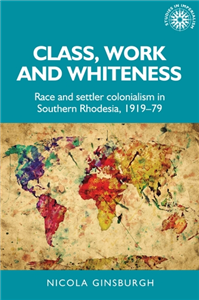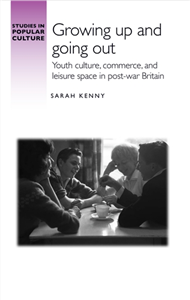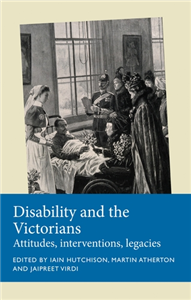Your Search Results
-
Promoted ContentMedicineSeptember 2022
Alcohol, psychiatry and society
by Waltraud Ernst, Thomas Müller, David Cantor
-
Promoted ContentSeptember 2009
The politics of alcohol
A history of the drink question in England
by James Nicholls
Questions about drink - how it is used, how it should be regulated and the social risks it presents - have been a source of sustained and heated dispute in recent years. In The politics of alcohol, Nicholls puts these concerns in historical context by providing a detailed and extensive survey of public debates on alcohol from the introduction of licensing in the mid-sixteenth century through to recent controversies over 24-hour licensing, binge drinking and the cheap sale of alcohol in supermarkets. In doing so, he shows that concerns over drinking have always been tied to broader questions about national identity, individual freedom and the relationship between government and the market. He argues that in order to properly understand the cultural status of alcohol we need to consider what attitudes to drinking tell us about the principles that underpin our modern, liberal society. The politics of alcohol presents a wide-ranging, accessible and critically illuminating guide to the social, political and cultural history of alcohol in England. Covering areas including law, public policy, medical thought, media representations and political philosophy, it will provide essential reading for anyone interested in either the history of alcohol consumption, alcohol policy or the complex social questions posed by drinking today.
-
 Trusted Partner
April 2022
Trusted Partner
April 2022Corona Chaos. Confessions from a pharmacist
by Simon Krivec
More than two years of pandemic is more than two years of corona clutter. Only a staggering level of helpfulness, improvisation and flexibility prevented the healthcare system from collapsing completely. In this highly topical book, pharmacist Simon Krivec tells of his incredible experiences and the stormy ups and downs of pandemic madness, missing masks and disinfectants, and the feeling of having been totally abandoned by a helpless state. We learn, for instance, of the short-term procurement of large quantities of ethanol and the transportation of the highly flammable substance, and just what lured the author – and 71,400 euros in cash – to visit the port of Neuss at night.
-
 Trusted Partner
Humanities & Social SciencesMarch 2017
Trusted Partner
Humanities & Social SciencesMarch 2017Guardians of Empire
The Armed Forces of the Colonial Powers, C.1700-1964
by Andrew Thompson, John M. MacKenzie, David Killingray
For imperialists, the concept of guardian is specifically to the armed forces that kept watch on the frontiers and in the heartlands of imperial territories. Large parts of Asia and Africa, and the islands of the Pacific and the Caribbean were imperial possessions. This book discusses how military requirements and North Indian military culture, shaped the cantonments and considers the problems posed by venereal diseases and alcohol, and the sanitary strategies pursued to combat them. The trans-border Pathan tribes remained an insistent problem in Indian defence between 1849 and 1947. The book examines the process by which the Dutch elite recruited military allies, and the contribution of Indonesian soldiers to the actual fighting. The idea of naval guardianship as expressed in the campaign against the South Pacific labour trade is examined. The book reveals the extent of military influence of the Schutztruppen on the political developments in the German protectorates in German South-West Africa and German East Africa. The U.S. Army, charged with defending the Pacific possessions of the Philippines and Hawaii, encountered a predicament similar to that of the mythological Cerberus. The regimentation of military families linked access to women with reliable service, and enabled the King's African Rifles to inspire a high level of discipline in its African soldiers, askaris. The book explains the political and military pressures which drove successive French governments to widen the scope of French military operations in Algeria between 1954 and 1958. It also explores gender issues and African colonial armies.
-
 Trusted Partner
March 1983
Trusted Partner
March 1983Das Grundgesetz.
Einführung in das Verfassungsrecht der Bundesrepublik Deutschland.
by Weber-Fas, Rudolf
-
 Trusted Partner
Trusted Partner
-
 Trusted Partner
Trusted Partner
-
 Trusted Partner
Humanities & Social SciencesSeptember 2020
Trusted Partner
Humanities & Social SciencesSeptember 2020Class, work and whiteness
by Nicola Ginsburgh, Alan Lester
-
 Trusted Partner
Humanities & Social SciencesDecember 2022
Trusted Partner
Humanities & Social SciencesDecember 2022Class, work and whiteness
Race and settler colonialism in Southern Rhodesia, 1919–79
by Nicola Ginsburgh
This book offers the first comprehensive history of white workers from the end of the First World War to Zimbabwean independence in 1980. It reveals how white worker identity was constituted, examines the white labouring class as an ethnically and nationally heterogeneous formation comprised of both men and women, and emphasises the active participation of white workers in the ongoing and contested production of race. White wage labourers' experiences, both as exploited workers and as part of the privileged white minority, offer insight into how race and class co-produced one another and how boundaries fundamental to settler colonialism were regulated and policed. Based on original research conducted in Zimbabwe, South Africa and the UK, this book offers a unique theoretical synthesis of work on gender, whiteness studies, labour histories, settler colonialism, Marxism, emotions and the New African Economic History.
-
 Trusted Partner
Socialism & left-of-centre democratic ideologiesOctober 2014
Trusted Partner
Socialism & left-of-centre democratic ideologiesOctober 2014Against the grain
The British far left from 1956
by Edited by Evan Smith and Matthew Worley
Against the grain is the first general history of the British far left to be published in the twenty-first century. Its contents cover a range of organisations beyond the Labour Party, bringing together leading experts on British left-wing politics to examine issues of class, race and gender from 1956 to the present day. The essays collected here are designed to highlight the impact made by the far left on British politics and society. Though the predicted revolution did not come, organisations such as the International Socialists, the International Marxist Group and Militant became household names in the 1970s and 1980s. Taken as a whole, the collection demonstrates the extent to which the far left has weaved its influence into the political fabric of Britain.
-
 Trusted Partner
Humanities & Social SciencesFebruary 2025
Trusted Partner
Humanities & Social SciencesFebruary 2025Growing up and going out
Youth culture, commerce, and leisure space in post-war Britain
by Sarah Kenny
In the decades following the Second World War, youthful sociability was remade as young people across Britain flocked to newly-opened coffee bars, beat clubs, and discos. These spaces, increasingly unknown and unfamiliar to the adults who passed by them, played a remarkable role in reshaping town and city centres after dark as sites of leisure and recreation. Telling the history of youth in post-war Britain from the ground up, through the towns and cities that young people moved through, this book traces how the new spaces of post-war youth leisure transformed both young people's relationship with their local environment and adults' perceptions of the possibilities and dangers of modern leisure. Growing up and going out offers a timely study of youth, commerce, and leisure that explores the reimagination, remaking, and regulation of the post-war city after dark.
-
 Trusted Partner
Humanities & Social SciencesJuly 2022
Trusted Partner
Humanities & Social SciencesJuly 2022Disability and the Victorians
Attitudes, interventions, legacies
by Iain Hutchison, Martin Atherton, Jaipreet Virdi
Disability and the Victorians brings together in one collection a range of topics, perspectives and experiences from the Victorian era that present a unique overview of the development and impact of attitudes and interventions towards those with impairments during this time. The collection also considers how the legacies of these actions can be seen to have continued throughout the twentieth century right up to the present day. Subjects addressed include deafness, blindness, language delay, substance dependency, imperialism and the representation of disabled characters in popular fiction. These varied topics illustrate how common themes can be found in how Victorian philanthropists and administrators responded to those under their care. Often character, morality and the chance to be restored to productivity and usefulness overrode medical need and this both influenced and reflected wider societal views of impairment and inability.
-
 Trusted Partner
Humanities & Social SciencesMarch 2020
Trusted Partner
Humanities & Social SciencesMarch 2020Disability and the Victorians
by Iain Hutchison, Martin Atherton, Jaipreet Virdi, Julie Anderson
-
 Trusted Partner
Trusted Partner
-
 Trusted Partner
May 2020
Trusted Partner
May 2020Die Klarheit
Alkohol, Rausch und die Geschichten der Genesung
by Leslie Jamison, Kirsten Riesselmann
Von außen betrachtet mag das Trinken als willentliche Selbstzerstörung erscheinen – für den Alkoholiker ist es so unausweichlich wie der nächste Atemzug. Manchem Künstler, von Raymond Carver über Billie Holiday und David Foster Wallace bis Amy Winehouse, erschien es gar ein Quell der Inspiration. Und auch Leslie Jamison trank, weil sie ihre Mängel verbergen und um jeden Preis besonders sein wollte. Doch dann war das Ausmaß der Selbstzerstörung so groß, dass sie sich Hilfe suchen musste. Und sie erkannte, dass sie erst genesen würde, wenn sie nicht mehr auf ihrer Originalität beharrte. Mitreißend erzählt Leslie Jamison von ihrer Abhängigkeit und dem harten Weg hinaus. Davon, dass die Loslösung vom Alkohol bedeutet, sein Bild von der Welt und von sich selbst radikal zu hinterfragen und zu verändern. Die Klarheit ist eine persönliche und kollektive Geschichte des Trinkens und des nüchternen Lebens – klug, bewegend aufrichtig und von unverhoffter Schönheit.
-
 Trusted Partner
MedicineDecember 2020
Trusted Partner
MedicineDecember 2020African nurses and everyday work in twentieth-century Zimbabwe
by Clement Masakure, Jane Schultz
-
 Trusted Partner
Biography & True StoriesMarch 2022
Trusted Partner
Biography & True StoriesMarch 2022Body Work
The Radical Power of Personal Narrative
by Melissa Febos,
In this bold and exhilarating mix of memoir and writing guide, Melissa Febos tackles the emotional, psychological, and physical work of writing intimately while offering an utterly fresh examination of the storyteller's life and the challenges it presents. How do we write about the relationships that have formed us? How do we describe our bodies, their desires and traumas? What does it mean to have your writing, or living, dismissed as "navel-gazing"-or else hailed as "so brave, so raw"? And to whom, in the end, do our most intimate stories belong? Drawing on her journey from aspiring writer to acclaimed author and writing professor-via addiction and recovery, sex work and academia-Melissa Febos has created a captivating guide to the writing life, and a brilliantly unusual exploration of subjectivity, privacy, and the power of divulgence. Candid and inspiring, Body Work will empower readers and writers alike, offering ideas-and occasional notes of caution-to anyone who has ever hoped to see their true self reflecting back from the open page.
-
 Trusted Partner
Biography & True StoriesMarch 2022
Trusted Partner
Biography & True StoriesMarch 2022Body Work
The Radical Power of Personal Narrative
by Melissa Febos,
In this bold and exhilarating mix of memoir and writing guide, Melissa Febos tackles the emotional, psychological, and physical work of writing intimately while offering an utterly fresh examination of the storyteller's life and the challenges it presents. How do we write about the relationships that have formed us? How do we describe our bodies, their desires and traumas? What does it mean to have your writing, or living, dismissed as "navel-gazing"-or else hailed as "so brave, so raw"? And to whom, in the end, do our most intimate stories belong? Drawing on her journey from aspiring writer to acclaimed author and writing professor-via addiction and recovery, sex work and academia-Melissa Febos has created a captivating guide to the writing life, and a brilliantly unusual exploration of subjectivity, privacy, and the power of divulgence. Candid and inspiring, Body Work will empower readers and writers alike, offering ideas-and occasional notes of caution-to anyone who has ever hoped to see their true self reflecting back from the open page.
-
 Trusted Partner
Biography & True StoriesMarch 2022
Trusted Partner
Biography & True StoriesMarch 2022Body Work
The Radical Power of Personal Narrative
by Melissa Febos,
In this bold and exhilarating mix of memoir and writing guide, Melissa Febos tackles the emotional, psychological, and physical work of writing intimately while offering an utterly fresh examination of the storyteller's life and the challenges it presents. How do we write about the relationships that have formed us? How do we describe our bodies, their desires and traumas? What does it mean to have your writing, or living, dismissed as "navel-gazing"-or else hailed as "so brave, so raw"? And to whom, in the end, do our most intimate stories belong? Drawing on her journey from aspiring writer to acclaimed author and writing professor-via addiction and recovery, sex work and academia-Melissa Febos has created a captivating guide to the writing life, and a brilliantly unusual exploration of subjectivity, privacy, and the power of divulgence. Candid and inspiring, Body Work will empower readers and writers alike, offering ideas-and occasional notes of caution-to anyone who has ever hoped to see their true self reflecting back from the open page.
-
 Trusted Partner
Trusted Partner


























